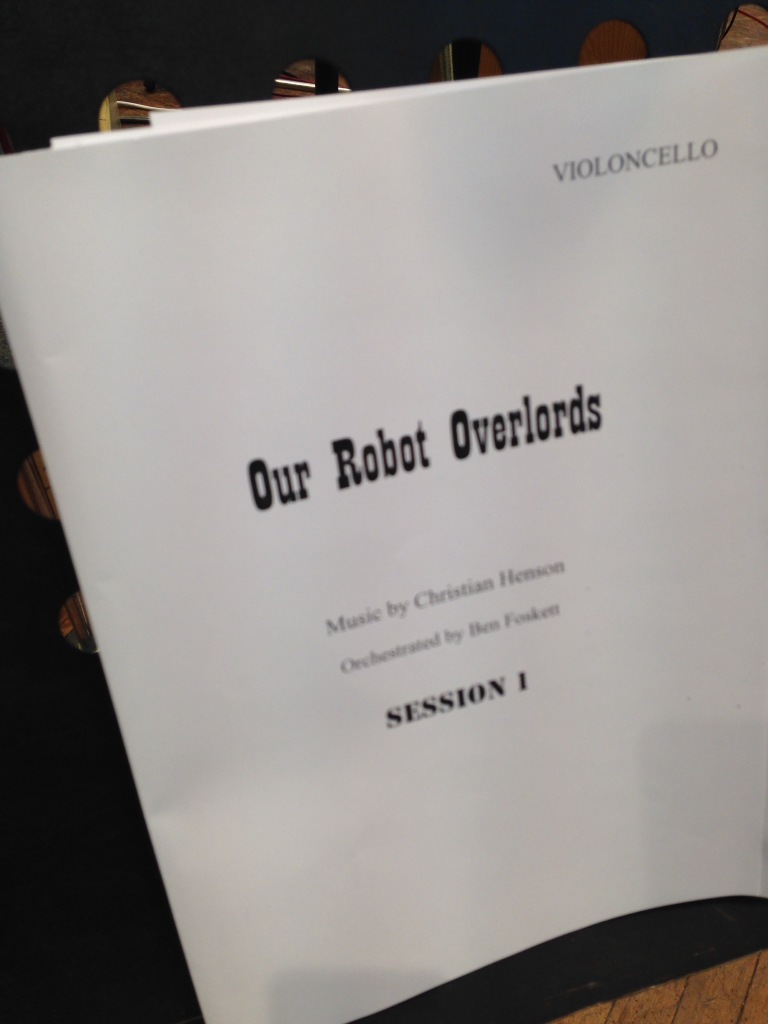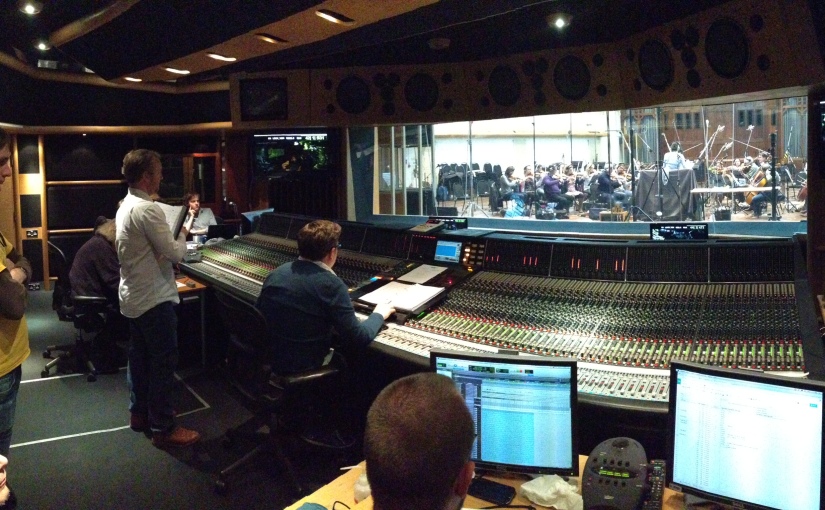In this jam-packed look back, I get to visit the set and bump into Sir Ben Kingsley and have a chat about Spitfires… as you do…
Saturday 22nd June
Belfast and Carrickfergus
Crikey, where do I start with the last couple of days? I had a meeting with my accountant, which doesn’t sound terribly exciting, but he did explain and reassure me on a few things, and I came out with a confidence that I can get through the next six months of unpaid leave from work in one piece.
On Thursday evening I was at a colleague’s retirement party and I saw Gillian Redfearn (Gollancz editor) with a big grin on her face… I got the go ahead to write the Robots book! They’re offering £10k (which I think I have to split with the production) and I gather it was Gillian who convinced them to do it. I gave her a huge hug!
Then first thing Friday, (my wife) Claire dropped me off at Gatwick and I was Belfast-bound again. First stop was at the production offices to see our editor Matt Platt-Mills, his assistant Vicki Webbley and the rushes and first assemblies of the film. It’s looking very good. You’re going to hear this a lot, but SBK is fucking awesome. His interpretation of Smythe is nothing short of bloody genius and his improv lines really work*.
*The whole cowboy Wayne bit is his. So good I pinched it for the book.
But also Milo in the scene where his dad dies… bloody hell, he really nails it
Scene after scene I was cackling with glee as each beat either surpassed my expectations or came very close to it. I left Matt and Vicki in good spirits and headed to the set on an industrial estate on the other side of Carrickfergus.
In a cavernous warehouse, there stood a huge bluescreen cyclorama, and next to it a set of the interiors of the houses in Fleetwood Street. I loved the details inside: the multicoloured piano keys, the plants in old baked bean tins, the graffiti on the walls, ‘Robot-Free Zone!’
When I arrived they were in the middle of the scene where Kate (Gillian Anderson) asks Smythe (Sir Ben Kingsley) if she can look after Connor. Everyone was on form, and I was sorry to be pulled away to do my EPK (electronic press kit – the kind of interviews you get as extras on DVDs).
These took place in the warehouse next door with the standing stones behind us as a backdrop. Trouble is, we were in a warehouse and not a proper soundstage, and so we had to keep stopping for the noise of trucks reversing, generators thrumming into life and jet aircraft zooming overhead*.
The noise did create problems throughout this section of the shoot: feet scuffling in the adjacent hall could ruin a take and our 1st Assistant Director Barry Keil had to lay down the law a few times.
*On Saturday we had about 40 minutes of the Red Arrows zooming about.
The EPK was fun. My interviewer Ian Thompson asked interesting questions and, thanks to everyone at Orion showing an interest over the past few months, I already had some well-rehearsed answers.
But when I returned to the set, the scene they were shooting was not going well.
It was the swear box scene. Designed to show that the kids were sick of being cooped-up, and that Kate might be losing her marbles.
There were two problems: tonally it was just too broadly comic, and these beats and ideas were covered in other scenes. It’s the kind of thing you desperately try to iron-out during rewrites, but this one somehow slipped through.
We finished shooting the scene, but concentrated on coverage for the montage that followed it.
I was then asked to rewrite a couple of bits for Milo’s scene with his home-made rocket launcher, and I got to write it in an empty trailer at the unit base.
Yes, I finally had my own trailer.
For a bit.
They finished the day with an exterior bluescreen shot of Kate driving the boys in the Jeep. When the huge fan they had wasn’t strong enough to suggest driving at full pelt through the hills, the SFX guys managed to find two canisters of compressed air. Very resourceful!
Gillian had to dash to catch a flight right after, and so I missed my opportunity to say hello. Big shame, but hey-ho…
I had dinner with Jon (Wright, director and co-writer) that night. He’s bowled over by SBK. We talked Skyhook*, an LA trip, and his desire to do more big budget movies. He’s tired, but working through it and he’s great with the cast and crew.
*Skyhook was an awesome spy adventure that Jon and I wrote featuring a female lead. Alas, we were told his by his LA management that no one wanted a female lead in a spy movie and it never went out. Yes… I know… FFS…
This morning was all about the bluescreen stage and Tamer Hassan and SBK facing off in the belly of the Skyship. It looked fricking amazing, like something from Star Wars. All of us, including Jon, were geeking out. Tamer’s best known for playing hard men in movies like The Business and Kick Ass. He’s certainly a hard man in our movie, but he seems to be having huge fun, holding his own against SBK in today’s scene.
There was some discussion about yesterday’s failed scene, and we decided to shoot some ennui boredom ideas for the montage. I was despatched to write them, but rather than go to the trailer (at the unit base about half a mile away) I sat on a sofa in the currently-unused house set.
This is where I found myself chatting to Sir Ben Kingsley and his PA Todd Hofacker. Sir Ben said some very nice things about the script and he asked what I was working on next. I told him it was a World War 2 movie (The Black Spitfire) and he seemed intrigued and definitely knew plenty about the period. We parted company, but ten minutes later he was back and asked if I knew the film A Matter of Life and Death. I told him it was a big influence on my new script and he approved. Since then I feel like I’ve been levitating about a foot in the air.
Callan and James came in on their day off to work on the scene I had written and they were about to start when my taxi arrived. A shame I couldn’t see them play with it, but I know I’ll enjoy the finished result.
Oh, and I got my photo taken in the Deep Scanner. My author photo for the book.
After the taxi ride where the driver asked for directions… twice… I met (actor friend) Lou McGhie at the airport. She and twenty of her army colleagues will be extras in the final celebration scenes! Brill to get an Ashtead Players/Slumming-It* actor on the movie.
*The Slumming-It Theatre Company was the name of the theatre company that I ran with my wife Claire, and Lou was one of our regular actors. And the Ashtead Players is the am dram group where Claire and I learned a lot of our craft as actors.
And now I’m home. A tired, but very happy writer.
In the end I got to keep the ten grand advance for the book, and the production got any royalties after it earned out. I think, for once, I got the better end of the deal there. To say that Gillian Redfearn was pivotal in my career as a writer would be the understatement of the century. She also read very early versions of what was to eventually become the Witches of Woodville, giving me encouraging notes on what, looking back, was complete crap! My thanks also to Lisa Milton, Jon Wood and Malcolm Edwards at Orion who had to give the nod for the deal to go ahead.
I tried to find the EPK interviews mentioned, but I don’t think they were ever used. And we did more at Pinewood later in the year, which suggests the producers weren’t happy with them. I think clips might have been used in the making of on the DVD/Blu Ray. I’ll have to check!
Wandering through the set I was constantly taking notes. The little bits of wonderful production design — the plants in baked bean cans etc — were all details that I pinched for the book. And just as well as you hardly ever see them on screen in the finished film. All parts of a greater mosaic.
The on-set rewrites definitely focus the mind. Knowing that everyone on set is waiting for you to pull your finger out and produce something pronto definitely puts a rocket up your backside. No time for staring out of the window. Open the laptop and get on with it and write without second guessing yourself. I learned an important lesson that day. Write without fear. It’s very liberating.










































